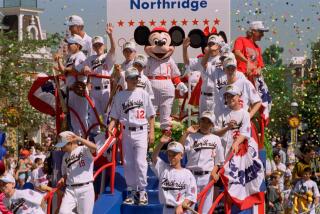Stadium May Not Save Northridge Baseball
- Share via
NORTHRIDGE — A hastily conceived plan to build a baseball stadium in the San Fernando Valley will not delay cuts in men’s sports programs that Cal State Northridge must make this week to meet budget and gender equity requirements.
Steven Soboroff, senior advisor to Mayor Richard Riordan, met Monday with Northridge President Blenda Wilson and Ron Kopita, the university’s vice president for student affairs, to discuss plans for a $3 million multi-use facility.
Result: A stadium might be a go, but the baseball program might be gone.
“We concluded it would be inappropriate to discuss at length any proposal that would involve the baseball program until a final decision was made regarding the program,” Kopita said. “However, we did conclude there may be other partnerships that would allow Steve and the university to move forward on a project.”
Kopita announced May 29 that Northridge must eliminate up to five men’s sports--baseball, volleyball, soccer, swimming and golf--to meet a tight budget and gender equity standards reached in and out-of-court settlement between the Cal State University system and the National Organization of Women.
Kopita returned Monday from a Minnesota fishing vacation to learn that over the weekend Soboroff had volunteered to lead an effort to build a stadium that could be used for high school games, camps and concerts in addition to Northridge baseball.
Although a stadium would not address gender equity concerns, baseball supporters believe a multi-use facility funded by naming rights could generate enough revenue to salvage the baseball program.
And if anyone could make the stadium a reality, it is believed to be Soboroff, 48, who recently has been central to several ambitious projects, from helping the $200-million downtown sports arena gain approval by the City Council last month to getting air conditioners into L.A. Unified School District classrooms before the summer heat wave.
Soboroff’s resume in addition to his work for the mayor’s office is impressive: He is the founder of a successful real estate consulting firm; president of the L.A parks and recreation commission; chairman of the Blue Ribbon Citizens Oversight Committee that oversees the spending of proposition BB funds; chairman of Big Brother of Greater Los Angeles; and vice president of Football L.A., a group working to bring an NFL franchise to the city.
His interest in the Northridge stadium stems partially from his Valley roots. Soboroff’s first job was as a maintenance worker at Braemer Golf Course in Tarzana and he delivered groceries throughout the Valley while attending Taft High in Woodland Hills.
“I committed to (the stadium project) without thinking twice,” Soboroff said. “I’m aware of the strong baseball interest in the Valley and the need for a multi-use facility that would be a source of pride for 1.5 million people.”
Soboroff became aware of the need for a stadium through Jack Foley, a Northridge professor of leisure studies and recreation. Foley and Soboroff campaigned for the passage of Proposition K in November, 1996, a measure that will raise $25 million a year each of the next 30 years for parks development.
Using Proposition K funds for the stadium appears unlikely, but Soboroff is convinced the private sector is the best source of money.
“The experiences we’ve had with the value of naming rights can translate this project into reality,” he said.
In a prepared statement, Wilson made it clear that Soboroff would remain a key figure in the building of a stadium.
“Very soon after the university’s decisions on intercollegiate sports and budget are completed, I will meet with Mr. Soboroff again to discuss possible opportunities,” Wilson said. “Consistent with the university’s strategic priority to build alliances with the community, I believe that, with Mr. Soboroff’s general offer of assistance, we will be able to find ways of supporting both the univerity’s athletic programs and the community’s recreation needs.
“We agree there are many fruitful areas of collaboration in the use of athletic facilities that we would wish to pursue in the future.”
Apparently, football is not one of those areas. Northridge plays in dilapidated North Campus Stadium, a facility in serious need of refurbishment. Kopita said that improvements to the football stadium or building a new stadium was not discussed with Soboroff.
“We did not talk about a football stadium,” Kopita said. “We agreed that given the other issues, we were not going to complicate this thing.”
Kopita said that an announcement will come this week regarding which sports will be cut. The university’s budget for the 1997-98 fiscal year will be completed by the end of June.
“After the budget is done, we can get back to more detail with Steve,” Kopita said. “I suspect that in the not too distant future we will have an announcement regarding this.”
More to Read
Get our high school sports newsletter
Prep Rally is devoted to the SoCal high school sports experience, bringing you scores, stories and a behind-the-scenes look at what makes prep sports so popular.
You may occasionally receive promotional content from the Los Angeles Times.







